
Attendees object to Congressional Republicans ceding authority to executive branch
View video of the March 23 "Empty Chair Town Hall
By Karen Pearlman
Screenshot: Crowd chants "Shame" over Issa's refusal to hold a town hall in his district.
March 28, 2025 (Escondido) – Hundreds of constituents in Republican Congressional Rep. Darrell Issa’s district gathered at an “Empty Chair Town Hall” event at the California Center for the Arts on Sunday, March 23.
A standing-room only crowd in the venue that holds about 400 people expressed a variety of concerns about everything from healthcare needs and veterans’ services to immigration and education. The event was also live-streamed on social media.
Created to bring attention to what they say is Issa’s penchant to avoid meeting constituents in a Town Hall format, the event was organized by Indivisible North County San Diego.
Indivisible North County San Diego is part of a national nonprofit group. Indivisible and calls itself a social movement organization for those interested in working with others to take positive action for progressive values. It seeks to create an open-minded future, and believes in “protecting our values, our neighbors and ourselves” through mounting a resistance to the Trump agenda.
Indivisible North County San Diego says its resistance is built on values of inclusion, tolerance, fairness and non-violent action, and works in cooperation with other local groups that support its goals and objectives.
The audience listened to Allison Gill, a podcaster and owner of MSW Media, Inc., and five community leaders speak as well as try to answer questions that would have been directed at Issa.
“Darrell Issa, step back, my freedom is protected by the constitution,” Gill said. “My government that you and Elon Musk are trying to sledgehammer is protected by laws and Congress.”
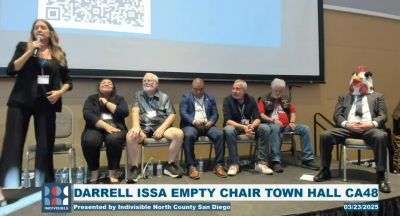 The panelists with Mills were Escondido Deputy Mayor Consuelo Martinez, Vista Unified School District Board Member Cipriano Vargas, Danny Jackson, Max Disposti (founder and Executive Director of the North County LGBTQ Resource Center) and Joe Houde. A man in a chicken mask reflected the group's claim that Issa is "chicken" for avoiding holding a Town Hall.
The panelists with Mills were Escondido Deputy Mayor Consuelo Martinez, Vista Unified School District Board Member Cipriano Vargas, Danny Jackson, Max Disposti (founder and Executive Director of the North County LGBTQ Resource Center) and Joe Houde. A man in a chicken mask reflected the group's claim that Issa is "chicken" for avoiding holding a Town Hall.
The Empty Chair Town Hall was part of a nationwide effort encouraged by Indivisible National during the congressional recess from March 13-23. The national Indivisible group is also spearheading a protest set for noon on April 5 at the Civic Center in downtown San Diego.
Attendees at the local March 23 event said they were looking for answers about why Republicans in Congress seem to have forgotten that there are three branches of government and have ceded their authority to the Executive Branch.
Constituent Randy James asked, “Please explain to me and those in the 48th Congressional District why you’re changing opinion and monetary gains from Russia for Russians’ support… and removing support from for Ukraine. How does that help us in the 48th District? How does that help the U.S. and our 80-year-old international alliance?”
Physician and scientist Dr. Steve Shrewsbury said, “I had a whole list of questions… but the question that I’ve been asked to pose to Darrell is, ‘Do you support the indiscriminate apprehension of undocumented migrant workers who keep California agriculture?’ They make up they make up 50 to 70 percent of farmer thought according to January 2025 figures… ‘Where do you propose these workers be shipped to and who will replace them in keeping Southern California agriculture and construction running? These migrants generate… $23 billion each year to the state. How do you propose these losses will be made up?’ ”
Others asked why Issa is in favor of cutting thousands of jobs, what is going on with DOGE (The Department of Government Efficiency) that has eliminated some agencies and implemented mass firings at others, and why the government feels it has to slash billions of dollars from the Department of Health and Human Services, which manages Medicaid.
Audience members said they wanted to know why Issa doesn’t appear to support “Dreamers” and those in DACA (Deferred Action for Childhood Arrivals, a program that provides temporary protection from deportation and work authorization to some but doesn’t offer a path to citizenship). Several said it seems that Issa has forgotten that America is made up of immigrants and others felt Issa is rubber stamping orders from President Donald Trump.
Those at the two-hour event were adamant that their collective voice and individual voices are not being heard by Issa nor the current administration in Washington, D.C.
Martinez, the daughter of Mexican immigrants, told those in attendance “I’m really happy that you’re all here to do your part so we can build a powerful movement in our region in order to challenge the craziness that is happening in D.C. I really believe that everything starts local and so that’s where I begin my fight and I’m here to be a resource and support all of you.”
Indivisible North County San Diego spokesperson Pamela Albergo said that Issa hadn’t held a Town Hall since 2017, “but the concerns of his constituents haven't gone away.”
The Times of San Diego reports that San Diego’s four other Congressional members -- all Democrats -- have not held live Town Halls in the past year either, though Rep. Sara Jacobs plans a live townhall April 22 in El Cajon.
Issa’s constituents say they have reached out to his office, but have been turned away.
Issa represents the 48th Congressional District, which encompasses some of East County and all of the Mountain Empire areas of San Diego County as well as part of southwestern Riverside County.
Issa’s 48th district includes the cities of Santee, Poway and northern Escondido. It also covers a wide swath of county areas including Alpine, Bonsall, Borrego Springs, Bostonia, Boulevard, Campo, Casa de Oro-Mount Helix, Crest, Descanso, Fallbrook, Granite Hills, Jacumba, Jamul, Lakeside, Mount Laguna, Pine Valley, Potrero, Ramona, Rancho San Diego, Valley Center and Winter Gardens.
The 48th also includes Temecula and Murrieta in Riverside County.
Asked about the Town Hall event, Issa did not respond for an official comment, but Jonathan Wilcox, communications director for the congressmen, said that in his more than 30 years of experience, Town Halls are very hit or miss for constituents.
“Constituents over the years have told us the format didn’t work for them -- not able to ask a question, not able to stand in line for a longer time, etc.,” Wilcox said. “Years ago, I think they were more common; nowadays we have so many ways to reach district residents. I think it’s a good mix.”
Wilcox said that of callers who contact Issa’s office about Town Halls, only about one of every 50 callers asks about them.
Issa also has done two “mobile offices,” as a way to reach people who are in areas not close to population centers, Wilcox said.
Wilcox also noted that “at the Vietnam-era veterans pinnings we did a while back, I’d say Rep. Issa personally met and spoke with at least 800 constituents. How many Town Halls would we need to do to have one-on-one conversations with 800 constituents?”
Gill said that Issa, who is a veteran, says on his webpage, “ ‘I love veterans… veterans are the backbone of this country.’ ”
“Then why are you helping slash 83,000 jobs from the Department of Veterans affairs?” Gill asked rhetorically. “Why are you helping gut the federal government that we built by the way? This is not a bloated government. We’ve been working on a skeleton crew for 50 years because of the Republicans like Darrell Issa… Darrell Issa doesn’t care about us.”
Claire Strong is a senior consultant for Galvanized Strategies, a company that provides strategic public affairs consulting and leadership services, and focuses on marketing, communications, government affairs, community engagement and executive leadership.
Strong said that “empty chair” events make a strong statement, but traditional Town Halls, where all parties are present, are far more productive for resolving issues.
“In my experience moderating contentious public meetings, I’ve seen how direct, face-to-face dialogue creates understanding and encourages real solutions, something an empty chair situation simply can't facilitate,” Strong said.
“Town Halls allow people on both sides of an issue to feel seen and heard, which is essential when it comes to addressing community concerns. When everyone is in the room, it leads to more constructive outcomes, while the absence of one side can have the opposite effect.”

East County News Service
Photos by Karen Pearlman
March 29, 2025 (Santee) - Mary Hennessy, the 90-something owner of Mary's Donuts, grabs a sweet treat during her business's 40th anniversary bash Saturday morning, March 29.
Hennessy, who plied the donut trade at a Winchell's Donuts, bought the former Zona's Donut Shop with her husband, and opened the original Mary’s Donuts and Coffee in 1984 on Mission Gorge Road in Santee. After a lease dispute with her landlord, Hennessy moved the popular donut spot just a few blocks away to a nearby strip mall along Carlton Hills Boulevard. Hennessy still oversees operations.


By Karen Pearlman
March 27, 2025 (San Diego’s East County) -- Public water utility entity Helix Water District isn’t just about water – it’s also about energy, power and air.
On Tuesday, the district with roots dating back to 1885 got on board with the future, breaking ground at its El Cajon operations center as part of the district’s transition to a zero-emission vehicle fleet through electrification.
The $11 million electrification project will install nearly 90 high-speed vehicle chargers at the district’s operations center.
Helix Water District is transitioning 86 medium- and heavy-duty vehicles and installing nearly six megawatts of charging infrastructure aligns with San Diego Gas & Electric’s mission to support public agencies and fleet operators in meeting California’s Advanced Clean Fleets regulation and local climate action plan goals.
The estimated completion date is April 2026 – and the project is thought to be the first of its kind in California, Helix officials say.
Helix is collaborating with San Diego County Air Pollution Control District, SDG&E, a Disadvantaged Community EV Charger Rebate program and other crucial strategic allies for funding and expertise during the process of installing the electrical capacity and charging infrastructure needed for the transition.
The San Diego County Air Pollution Control District is the local government agency charged with improving the air quality in San Diego County to protect public health.
The district is electrifying its vehicle fleet to meet the state of California’s advanced clean fleet requirements. The district says it will be able to complete this project almost entirely without impacting water rates.
In 2024, the State of California’s advanced clean fleet regulation required that 50% of all new medium and heavy-duty vehicles purchased by public agencies be zero emission vehicles. That number increases to 100% in 2027.
With the regulation, public agencies will need to deploy charging infrastructure that will power their new fleets for both daily and emergency operations use.
The charging stations will not only serve the district’s fleet but will also be available to surrounding agencies to utilize during emergencies and as they work through challenges and costs to electrify their own fleets.
 “As a local public agency, we must comply with state regulations and this project needs to move forward now to take advantage of financial incentives,” said Helix Water District Board Member Mark Gracyk.
“As a local public agency, we must comply with state regulations and this project needs to move forward now to take advantage of financial incentives,” said Helix Water District Board Member Mark Gracyk.
“We’re not doing this reluctantly. (Helix has) already reduced our energy use by 15 percent and our carbon footprint by 40 percent. This project will be a model for other agencies working to electrify their fleets and help the cities we serve meet their climate action plan goals.”
The Helix operations center in El Cajon houses the majority of the district’s fleet, which transports crews responsible for the maintenance of 742 miles of pipeline, valves, hydrants and meters for its nearly 280,000 customers.
The project has been funded in part with nearly $9 million through grants and rebates, and supports neighboring public agencies as they work toward the electrification of their own vehicle fleets.
Helix received a $5.2 million grant from the SDCACPD, a $2.2 million grant from SDG&E’s “Power Your Drive for Fleets” program and an additional $1.5 million through the Disadvantaged Community Electric Vehicle Charger Rebate Program. The district will fund the remaining $2 million.
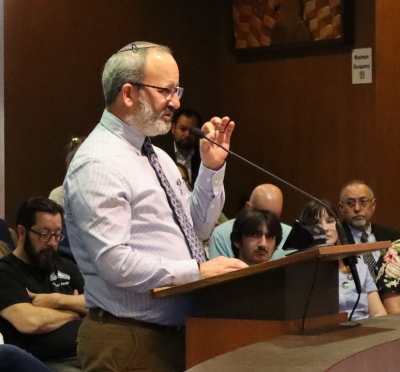
By Karen Pearlman
Photo: Rabbi Scott Meltzer said his synagogue in San Diego has twice been vandalized with antisemitic graffiti.
March 26, 2025 (El Cajon) -- The El Cajon City Council took a step toward condemning hate by unanimously voting for a resolution to adopt the International Holocaust Remembrance Alliance’s Working Definition of Antisemitism.
The City Council’s 5-0 vote Tuesday afternoon came on the heels of 40 public speakers weighing in on the resolution to condemn antisemitism, introduced earlier this month by El Cajon Mayor Bill Wells and Councilman Gary Kendrick.
“Antisemitism reared its ugly head again with the murder of 1,200 innocent men, women, children and babies by Hamas on October 7th," Kendrick said, referring to the U.S.-designated terrorist group’s attack in Israel on Oct. 7, 2023. “I have several Jewish friends who are afraid to go out in public. Jewish students have been attacked at colleges. This hate must stop. This resolution is a small step in that process.”
The IHRA’s definition of antisemitism will be used as an education resource for police and other departments in the city of El Cajon.
It reads: “Antisemitism is a certain perception of Jews, which may be expressed as hatred toward Jews. Rhetorical and physical manifestations of antisemitism are directed toward Jewish or non-Jewish individuals and/or their property, toward Jewish community institutions and religious facilities.”
The resolution includes contemporary examples of antisemitism, adopted by the IHRA on May 26, 2016, as an important tool to address antisemitism.
Wells said he was sent a social media post from a group that calls itself the “Jewish Voice for Peace,” which accused the mayor of intending to give orders to the city’s police department “to arrest anybody for a hate crime” for making a statement negative about Israel, which Wells said wasn’t true.
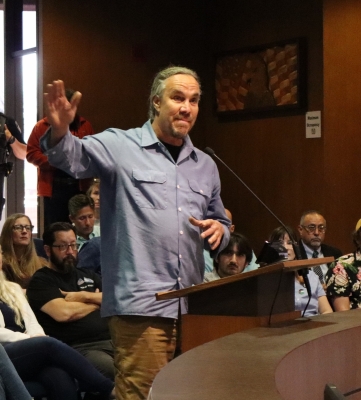 Public speaker Spenser Little (right) said he didn’t agree with the resolution and felt it was an unfair “application of language” and an attempt to stop criticism of Israel. He spoke of the city’s large number of refugees from the Middle East who have emigrated to America to get away from violence.
Public speaker Spenser Little (right) said he didn’t agree with the resolution and felt it was an unfair “application of language” and an attempt to stop criticism of Israel. He spoke of the city’s large number of refugees from the Middle East who have emigrated to America to get away from violence.
“El Cajon’s full of children that are from war-torn countries watching this happen in another country, and now they can’t speak their mind freely… and the freedom of speech to say what’s happening right in front of them,” Little said. “The silencing of the community to not talk about what the truth is, (what is) happening, is what concerns me.”
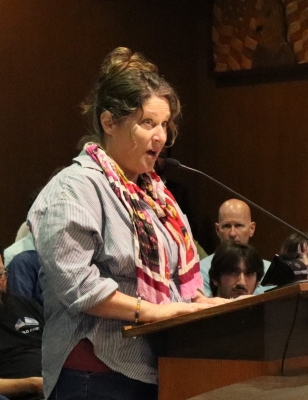 Speaker Tina Bernard (left), who said she converted to Judaism many years ago, said that those opposing this definition are doing it “because they want to continue their behaviors unchecked.”
Speaker Tina Bernard (left), who said she converted to Judaism many years ago, said that those opposing this definition are doing it “because they want to continue their behaviors unchecked.”
Bernard said that the Jewish community and others “deserve a clear definition that protects against hate, safeguarding not just Jews but the values of mutual respect and co- existence that underpin our western democracy.
“It helps our line between free speech and hate crimes --and that line has gotten way too blurred lately.”
Another speaker, Julie Litman, called adopting the IHRA language of antisemitism “not simply a symbolic act -- it’s a moral imperative.”
“Antisemitism is a present-day crisis and it’s growing,” Litman said. “Jewish communities, like all others, deserve to feel safe, respected and valued, and when we let hate go unchallenged and when we let prejudice and false accusations fester, we all suffer.”
Litman said the IHRA verbiage sends a clear message that hate will not be tolerated, “no matter what it takes, and we’re ensuring that the next generation grows up in a community that stands up against injustice and stands with those who face discrimination.
“It’s more than just about the Jewish community, it’s about our shared humanity and it’s about making El Cajon a place where everybody, regardless of their background, can live in peace.”
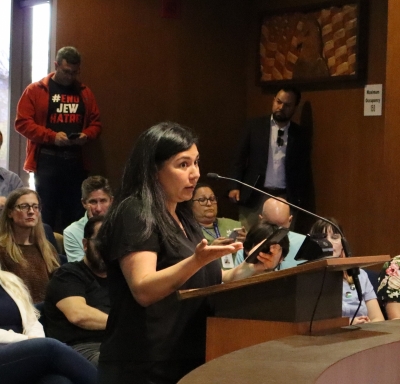 Julia Gomez (right), interim managing director of the ACLU of San Diego and Imperial counties, said her group had sent a letter to the City Council urging a no vote on the resolution on antisemitism.
Julia Gomez (right), interim managing director of the ACLU of San Diego and Imperial counties, said her group had sent a letter to the City Council urging a no vote on the resolution on antisemitism.
“The First Amendment applies to all of us, including those whose positions do not align with their with their government’s political stances,” Gomez said. “Any attempt to silence their voices is patently undemocratic. The ACLU staunchly defends their rights to criticize domestic and foreign governments. The IHRA definition on anti-Semitism is overbroad and incorrectly equates protected political speech with discrimination.”
Some speakers spoke to conflating anti-Zionism -- or opposition to the Israeli state -- with antisemitism, which is the discrimination, violence or dehumanizing action toward Jews.
Jose Cortes said he was “really disappointed to see how easy and very quickly we’re moving our proposal that really kind of exceeds the scope of the local City Council.”
Cortes said the resolution “kind of reduces and kind of divorces the genuine anti-Semitism that’s happening even here in El Cajon as recently as July from the very real systems that also affect Islamophobia, racism, homophobia (and) transphobia.”
While some public speakers at the meeting shared concerns that the resolution would chill free speech, Councilman Steve Goble said he didn’t think that was the case.
The resolution also mentions the city’s commitment to protecting freedom of speech and expression.
“We need to protect people who feel threatened by their very existence,” Goble said.
Rabbi Scott Meltzer of Ohr Shalom Synagogue in the Bankers Hill area of San Diego encouraged people to read the working definition of antisemitism and read the city’s resolution.
“While criticism of Israel is sincere and legitimate in all places where it is sincere and legitimate, it cannot be used as an opportunity for antisemitism,” Meltzer said. “That is rather than people being falsely accused of antisemitic comments when they criticize Israel, we are now finding that antisemitism is being given to the community couched as anti-Israel rhetoric.
“Just recently my synagogue twice was vandalized. Clearly, vandalizing the synagogue is an antisemitic act and the comments that were made on all the buildings were anti-Israel comments.”
City Manager Graham Mitchell said the IHRA Working Definition of Antisemitism will “address antisemitism and all other forms of discrimination directed toward anyone within El Cajon.”
Mitchell said the resolution references the city’s diverse population and calls for nondiscrimination against all, including minority groups, refugees, immigrants and asylum seekers.
Although statistics on antisemitic acts in El Cajon were not available, and numbers for 2024 not tabulated, the Anti-Defamation League reported that the greater San Diego area recorded 108 incidents of antisemitic assault, vandalism and harassment in 2023, soaring to 200 percent above the previous record of 36 in 2022.
The numbers reflect a global trend as Jewish communities worldwide face have faced heightened tensions and hatred in response to the Oct. 7, 2023 massacre and ongoing conflict – as seen on college campuses, in public areas and at anti-Israel demonstrations.
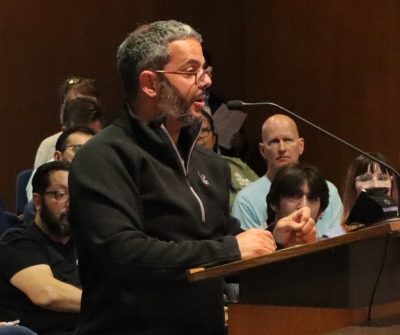 Alberto Mansur (left), a Mexican-American Jew, told the city council that “being a Jew is easy… until it’s not easy.”
Alberto Mansur (left), a Mexican-American Jew, told the city council that “being a Jew is easy… until it’s not easy.”
“It’s not easy when people hate you for being a Jew,” Mansur said. “Not because of who you are but because of what you are. Being a Jew is being hated from both the left and from the right… Adopting (the IHRA verbiage) is crucial in saving our Jewish communities from violence and discrimination especially in light of rising antisemitism today.”
The dramatic spike of antisemitic acts in San Diego included 58 incidents post-Oct. 7, 2023 (during the last 85 days of the year). The San Diego region has about 100,000 Jews, making up about 3 percent of the greater population, according to the American Jewish Committee.
The ADL also reports that antisemitic incidents across the U.S. have skyrocketed 360 percent in the aftermath of the attack in Israel. With a population of about 6.3 million, Jews make up about 2 percent of the total U.S. population.
Nicole Murray-Ramirez of the San Diego Human Relations Commission, said that “hate crimes against the Jewish community is at an all-time high.”
“Jewish students are not safe at our region’s colleges and universities, and have been threatened and harassed,” said Murray-Ramirez, who added that he also has been discriminated against as a Latino Catholic man. “Nazi hate material has been plastered around Jewish neighborhoods and temples threatening children and families. In my over 16 years of state, county and city service, I’ve never witnessed such hate as that toward the Jewish community and now more than ever, we need the IHRA definition.”

Organizers are seeking a headline sponsor
East County News Service
March 26, 2025 (Escondido) -- Mark your calendars for Valley Vibes, a free, family-friendly fiesta with interactive exhibits, great food, crafts and live music courtesy of North Park Rock-n-Blues Band. Valley Vibes will run from 11 a.m. to 3 p.m. Sunday, June 1, at the Sikes Adobe Historic Farmstead, 12655 Sunset Drive, Escondido. The San Dieguito River Valley Conservancy and San Dieguito River Park Joint Powers Authority are hosting the free event to celebrate nature and draw attention to the organizations’ conservation, education and recreation programs.
“Our plan is to have a great time while showing visitors the value of nature and how much it deserves our protection,” said Conservancy Executive Director Cheryl Goddard.
To offset costs, organizers are seeking a headline sponsor.
More than a dozen partner organizations are joining the party to showcase wildlife in the watershed. Visitors can participate in demonstrations of outdoor skills, get up close with reptiles, meet adoptable senior dogs, learn to track wildlife and interact with conservation experts.
Exhibitors include: San Dieguito River Valley Conservancy; San Dieguito River Park JPA; Volcan Mountain Foundation; Southwestern Field Herping Society; Master Gardeners; Surprise Farm Retreat Center; Friends of Sikes Adobe; Ilan-Lael Foundation; San Diego Turtle and Tortoise Society; San Diego Mountain Biking Association; Frosted Faces Foundation; San Diego Tracking Team; Kit Fox Outfitters; Free Flight Exotic Bird Sanctuary, and City of Escondido.
Interested in sponsoring Valley Vibes? As a $5,000 headline sponsor, your organization can be front and center during the event while tying your brand to our conservation and education mission.
Exclusive headline sponsors benefits include: prominent placement on all digital and print promotions including websites, social media, newsletters and press releases; display of your banner for maximum exposure at the event, and multiple sponsor announcements during the event to highlight your support. Sponsorship of Valley Vibes is tax deductible. Let’s make Valley Vibes a huge success together!
Contact 858-866-6956 or sdrvc@sdrvc.org.
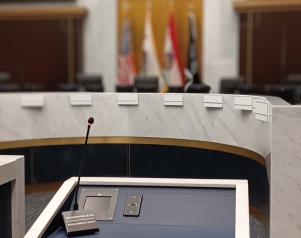
By Gig Conaughton, County of San Diego Communications Office
March 26, 2025 (San Diego) - Have you ever wanted to speak about an issue at a San Diego County Board of Supervisors meeting?
- Saturday, April 5 at 10 a.m. (Zoom registration link)
- Monday, April 7 at noon (Zoom registration link)
- Monday, April 7 at 7 p.m. (Zoom registration link)
- Go online to “San Diego County, CA Meetings” webpage: The new speaker-request system is easy to use. Use your smartphone, computer, laptop, or other device to go to the webpage at: https://PublicComment.SanDiegoCounty.gov.
- Click on the Meeting You Want to Speak At: Click on the meeting date for the meeting you want to comment at. That will provide information about the meeting.
- Click “Register”: Click on the blue “Register” box at the bottom of the page.
- Fill out the Form: Clicking the “Register” button will bring up a set of instructions, the online submittal form, and the list of agenda items for you to select one or more items that you want to speak to. The submittal form can be translated into multiple languages. Simply fill out your information, mark the item or items you wish to speak to, and whether you’re attending “In Person” or “Virtually” by phone.
- Scroll to request Interpreter if Needed: Scroll to the bottom of the submission form to request an interpreter if English is not your first language.
- Check the box to ask to be called when the Board meeting starts: You can also check a box to subscribe to updates on the Board of Supervisors.
- Click “Register” again at the bottom: And you’re all set. You’ll receive an email confirming your request to speak.

By Miriam Raftery
Photo courtesy of Library Foundation San Diego
March 26, 2025 (San Diego) - On Friday, March 14, President Trump issued an Executive Order intended to drastically reduce funding from the Institute of Museum and Library Services (IMLS), the only federal agency dedicated to funding library services.
“Without IMLS funding, the 37-branch San Diego Public Library system will lose a significant tool for maintaining, delivering, and developing innovative services for its patrons, said Patrick Stewart, CEO of the Library Foundation SD. “These cuts will impact a wide range of San Diegans — from a parent whose child relies on the Homework Center at their neighborhood library to the entrepreneur learning how to write a business plan at The StartUp center at the Central Library @ Joan Λ Irwin Common. The library is a core public service and a community cornerstone that needs to be safeguarded for our city’s future.”
The San Diego Public Library system uses federal funding distributed through IMLS to support several local initiatives. Loss of funding will negatively impact San Diegans who participate in programs every day including Lunch @ Your Library, adult literacy programs such as READ/San Diego, youth training and career development, entrepreneur and workforce development programs, Stewart added.
The Library Foundation SD advocates for the City of San Diego Library Department. San Diegans can learn how to participate in this advocacy by visiting libraryfoundationsd.org/takeaction.
Dulzura author, editor and children’s book illustrator Clarissa McLaughlin from Santee, in an email to ECM, stated, “I have relied on libraries my entire life. I have read a plethora of library books since early childhood, I volunteered at my local library in high school, and now as an adult, I'm working to get my own books into libraries. Libraries are both an essential service to the American people and are critical to my professional industry. I have relied on my library as a polling location and I use Libby all the time to listen to audiobooks, both for fun and for my MFA classes, in which I'm studying Popular Fiction Writing and Publishing.”
She added, “My only wish for my library is that it had more funding so it could be open on Sundays again. Normally, I can only visit on Saturdays as I work 9-6, Monday-Friday. My library is well-loved and well-needed. It cannot be defunded.”
Dulzura resident Connie Kirkpatrick notes that libraries today provide more than books, serving as community centers that support education, career and personal development. In an email to ECM, she wrote, ““My library has been a cornerstone of my learning journey, providing books, classes, and programs that have expanded my knowledge and skills. Whether it’s attending author talks, technology workshops, or educational lectures, I have continually benefited from the opportunities my library offers. In today’s digital age, free access to information is more crucial than ever, and my library ensures that everyone, regardless of financial background, can benefit from books, online resources, and the internet.”
Libraries also serve as a community gathering place that welcomes people of all ages to come together for events, discussions and support groups, she observed. “It has been instrumental in helping individuals with job searches, resume writing, and skill-building programs that empower them in their careers. Whether it’s a student needing a quiet study space or an entrepreneur researching market trends, the library caters to diverse needs.”
In addition, the library plays a vital role in preserving our local history and culture. “Through archives, genealogy services, and historical exhibits, it safeguards our heritage for future generations. Additionally, creative spaces like makerspaces, technology labs, and writing workshops encourage innovation and artistic expression, making the library an incubator of new ideas,” Kirkpatrick stated.
“For those in rural or underserved areas, such as myself, the library is a lifeline. It bridges the digital divide by offering free internet access, computers, and technical assistance, ensuring that no one is left behind in the information age. More importantly, it provides a safe and inclusive environment where everyone is treated with dignity and respect,” Kirkpatrick concludes. “In a time when access to knowledge, technology, and community support is more essential than ever, libraries remain a fundamental public good. I urge continued investment and advocacy for these vital institutions so they can continue to serve and uplift our communities.”

By Miriam Raftery
March 25, 2025 (Rancho San Diego) – Today, the Joint Powers Authority (JPA) for the Water Conservation will meet to weigh opens for long-term funding and stability of the Garden at Cuyamaca College.
At its Feb. 25 meeting, the board discussed future funding options after the City of San Diego’s representative Nicole Beaulieu DeSantis announced intent for San Diego to withdraw from the JPA in light of the city’s budget crisis. Helix and Otay water district representatives voiced optimism that their agencies will likely be able to fill the funding gap left by San Diego’s departure and avert having other agencies leave the JPA.
Lauren Magnusen, Director of the garden, provided good news on improvements in Garden revenues outside of the water agencies’ contributions. Large donations have come in from the Sam Ciccati Foundation and major donor Maggie Burnett.
“The numbers are a lot better than in the past,” she told the board. “We have more admissions and more events.” The Garden has 77 new members and drew over 2,500 visitors in the prior two months, she said. Events are returning, including Tomatomania in early March and the Spring Garden and Butterfly Festival May 3.
But Magnusen added, “If we want more revenue, it’s in education. For education, we need educators.”
The board eliminated the Ms. Smartyplants education programs when it took over operations of the garden from the financially troubled nonprofit Friends of the Water Conservation Garden, which has since declared bankruptcy.
Helix Water District director Brian Olney said that despite the improved revenues, without contributions of the JPA’s member agencies, “The garden would be $180,000 in the hole right now.”
A draft letter has been sent to each member water agency for review; results are expected to be discussed at today’s meeting. It proposes that short term, Helix and Otay Water Districts will share in covering the revenues lost from San Diego pulling out.
Helix representative Dan McMillan said Helix is “fully committed to an upward budget. We will cover half if the city pulls out.”
Otay representative Jose Lopez said he believes Otay is committed, adding, “We’ll give it the best shot we’ve got.”
Sweetwater representative Steve Castenada asked for a non-escalator clause to be sure no agency would be “on the hook” for higher contributions if any agencies pull out in the future. With that, he said, “We could probably get approval for more than two years.”
If increased funding doesn’t come through, the JPA would consider turning over operations of the Garden to the Grossmont-Cuyamaca Community College District.
Chancellor Lynn Neault said, “We’re fully committed to the Garden,” but cautioned that they would need at least 18 months, and preferably two years notice to take it over, since it takes time to create college-oriented educational programs.
The Chancellor praised the work of the Garden’s volunteers, who provided 1,245 volunteer hours in the prior month alone. “God bless the volunteers,” Neault said. “That’s the work of 30 people. They’re the backbone of operations—it’s astounding.:
The JPA aims to make a determination as early as April on a plan for continued funding and future operations of the Garden after the current agencies’ agreement ends June 30.

Program to promote sustainable transportation
Source: City of La Mesa
Image by raju shrestha on Pixabay
March 24, 2025 (La Mesa) - The City of La Mesa is introducing a pilot E-Bike (Electric Bike) Incentive Program, designed to encourage biking as a primary mode of transportation for those who live and work in La Mesa. As transportation remains the largest contributor to air pollution and greenhouse gas emissions in the city, reducing car trips will help create cleaner air and a healthier community.
Funded through a grant from San Diego Community Power, the City has partnered with two local bike shops to offer point-of-sale discount vouchers to make purchasing an approved e-bike more affordable. By reducing upfront costs, the City aims to provide residents and employees with a healthy, convenient, and sustainable alternative to driving — making it easier to commute, run errands, and explore La Mesa. Applications open on March 26, 2025, at 12 p.m. and close on April 14, 2025, at 11:59 p.m. The City is offering two tiers of vouchers:
- $1,200 for Income-Qualified applicants
- $800 for Standard applicants
To be eligible, applicants must be 18 years or older and either live in La Mesa or work for a business within the City. Approved applicants will be required to complete a mandatory virtual e-bike safety class before receiving their voucher.
Applications can be submitted online or in person at City Hall. Due to limited funding, vouchers will be awarded through a scoring and random selection process, prioritizing the first 150 applicants. Higher scores will be given to those who plan to use their e-bike frequently for commuting or errands within La Mesa.
To support safe riding, the City is partnering with the San Diego County Bicycle Coalition to offer a series of free bike safety and educational events throughout 2025. The first session, “All About E-Bikes,” will take place on March 27, 2025 at 6 p.m., a virtual course covering e-bike types, safety tips, details on the incentive program, and more.
To register for the class, visit San Diego County Bicycle Coalition's website.
For more information on the E-Bike Incentive Program, eligibility requirements, and educational opportunities, click here.

By Tesa Balc, Times of San Diego, a member of the San Diego Online News Association
Photo: Rep. Sara Jacobs in her congressional office. (File photo courtesy of Jacobs’ office via Facebook)
March 24, 2025 (Jacumba) - A San Diego Democrat said Saturday that Republicans have told her they will not back President Donald Trump if he defies court orders.